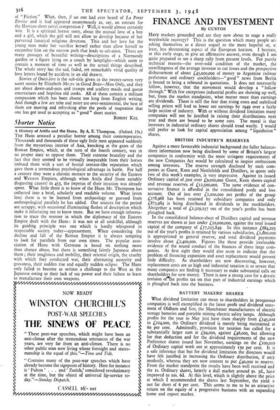FINANCE AND INVESTMENT
By CUSTOS
HAVE markets grounded and are they now about to stage a really worthwhile recovefy? This is the question which many people are asking themselves as a direct sequel to the more hopeful or, at least, less threatening aspect of the European horizon. I hesitate, at this early stage, to give an affirmative answer, even though I am quite prepared to see a sharp rally from present levels. For purely technical reasons—the over-sold condition of the market, the unwillingness of the average investor to cut losses and the prospective disbursement of about L45,000,000 of money to Argentine railway preference and ordinary stockholders—" good" news from Berlin is bound to bring a rebound in quotations. It does not necessarily follow, however, that the movement would develop a "follow through." With few exceptions industrial profits are showing up well, but, from the market standpoint, what matter more than earnings are dividends. There is still the fear that rising costs and stabilised selling prices will lead to lower net earnings by 1949 over a fairly large section of industry. With or without dividend limitation many companies will not be justified in raising their distributions next year and there are bound to be some cuts. The moral is that investors in industrial ordinary shares should tread warily. I would still prefer to look for capital appreciation among "liquidation" shares.
BRITISH INDUSTRY'S RESERVES
Against a more favourable industrial background the fuller balance- sheet information now being disclosed by some of Britain's largest companies in conformity with the more stringent requirements of the new Companies Act would be calculated to inspire enthusiasm among investors. The reserve strength disclosed by such com- panies as 'Guest, Keen and Nettlefolds and Distillers, to quote only two of this week's examples, is very impressive. Against its issued Ordinary capital of ,just over £9,00o,000 Guest, Keen shows capital and revenue reserves of £12,5oo,000. The same evidence of con- servative finance is afforded in the consolidated profit and loss account. Out of just over L2,000,000 net profits of the group £278,968 has been retained by subsidiary companies and only £873,984 is being distributed in dividends to the stockholders. Altogether a total of £1,329,257 out of the year's profits has been ploughed back.
In the consolidated balance-sheet of Distillers capital and revenue reserves are shown at just under £5o,000,000, against the total issued capital of the company of £17,225,849. In this instance £684,203 out of the year's profits is retained by various subsidiaries, Li,doo,000 is appropriated to general reserve, and total dividend payments involve about £2,400,000. Figures like these provide irrefutable evidence of the sound conduct of the finances of these large com- panies. At first sight they would also seem to indicate that the problem of financing expansion and asset replacement would present little difficulty. As shareholders are now discovering, however, replacement costs are so high and industrial taxation is so severe that many companies are finding it necessary to make substantial calls on shareholders for new money. There is now a strong case for a drastic revision °Mlle profits tax on that part of industrial earnings which is ploughed back into the business.
BATTERY MAKERS' SHARES
What dividend limitation can mean to shareholders in prosperous companies is well exemplified in the latest profit and dividend state- ment of Oldham and Son, the Manchester manufacturers of electric storage batteries and portable mining electric safety lamps. Although profits for the year to May 31st have risen sharply from £145,000 to £224,000, the Ordinary dividend is merely being maintained at 60 per cent. Admittedly, provision for taxation has called for a substantially larger sum at £94,000, against £46,000, but allowing for that deduction and for the dividend requirements of the new Preference shares issued last November, earnings on the Doo,000 of Ordinary capital work out at approximately 130 per cent. It is a safe inference that but for dividend limitation the directors would have felt justified in increasing the Ordinary distribution, if only modestly, whereas they are now content to put £4o,000 to reserve. From the market standpoint the results have been well received and the is. Ordinary shares, latterly a dull market around 95. 3d., have improved to Km 6d. At this level, which is slightly above the price at which I recommended the shares last September, the yield is not far short of 6 per cent. This seems to me to be an attractive return on the equity of a progressive business with an expanding home and export market.


































 Previous page
Previous page